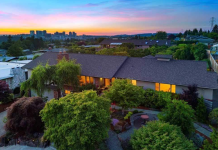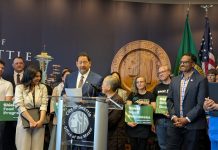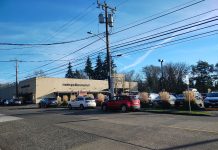Seattle Growth Plan Amendments Would Shrink Neighborhood Centers, Expand Density Incentives
The Seattle City Council will spend the next month considering the 106 different amendments, which would push the city's growth plan toward allowing more types of housing... or scale back areas where density increases are proposed.
Rinck Proposes Restoring Growth Centers Dropped from One Seattle Plan
The potential Seattle Comprehensive Plan changes, which are set to be discussed Monday, would add back growth centers around Gas Works Park, Alki, North Capitol Hill, and other areas. Councilmember Rinck also proposes legalizing corner stores and removing parking mandates citywide.
Op-Ed: Cascadia’s Awakening — Building a Region That Works for All
Washington State has big housing plans and ambitious planning tools, but it needs binding commitments across public, private, and social sectors to turn vision into reality. As it stands, housing isn't being built fast enough to stem the affordability crisis.
Bellevue Council Approves Scaled-Back Middle Housing Code
A narrow four-member majority caved to housing opponents as the Bellevue City Council finalized zoning changes impacting the city's lower density residential areas. Scaling back an ambitious proposal that increased flexibility for builders, Bellevue is only set to exceed the state minimum in a few areas.
Rinck, Harrell Propose Progressive Business Tax Overhaul to Bolster Seattle Budget
On Wednesday, Seattle Councilmember Alexis Mercedes Rinck unveiled a proposal overhauling the city's Business and Occupation tax that she hopes to put before voters this November – if she can win over her colleagues. Dubbed the Seattle Shield Initiative, it would broaden the exemption for small businesses, but raise taxes on larger businesses.
Central Puget Sound’s Transportation Funding Gap Tops $78 Billion Through 2050
Despite heavy attention on challenges funding transportation at the state level, shortfalls are projected to hit transit agencies and city transportation networks hardest. With few tools available to raise progressive transportation revenue at the local level, the future looks bleak without reform.
Op-Ed: Seattle Council Should Scale Up Neighborhood Centers in Growth Plan
On Monday, June 23, the Seattle City Council is holding a public hearing on the One Seattle growth plan. Housing advocates must defend the 29 neighborhood centers in the plan and push to add more. Jazmine Smith lays out the case for these eight additions.
Harrell Official Minimizes Cuts to Housing Growth Centers as ‘Very Small’
After dozens of blocks were dropped from the One Seattle housing growth plan, planner Michael Hubner downplayed the changes as minimal. The Seattle Planning Commission painted the move as pushing the city is headed in the wrong direction.








